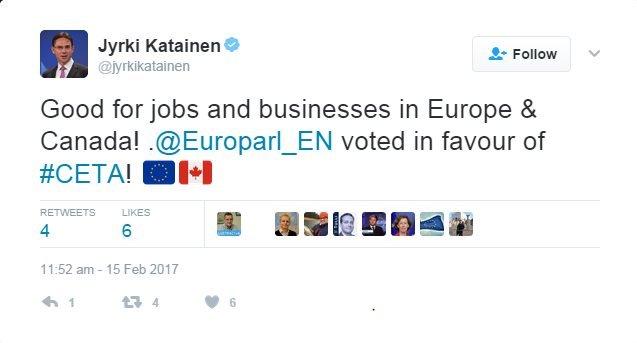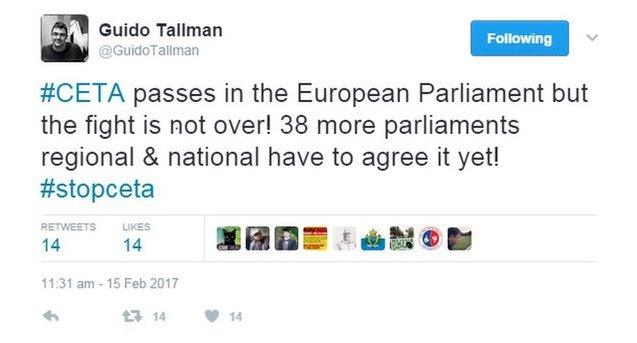Ceta: EU parliament backs free trade deal with Canada
- Published

Protesters tried to block access to the European Parliament ahead of the vote
The European Parliament has approved a landmark free trade deal with Canada.
EU lawmakers backed the Comprehensive Economic and Trade Agreement (Ceta) by 408-254 votes despite crowds of protesters contesting the deal outside.
It means parts of the deal, such as tariff reduction, will come into force eight years after negotiations began.
But other, more controversial aspects of the deal, such as the investor court system, will require ratification by EU member states which could take years.
Reality Check: Would Canada's deal with the EU be a good model for the UK?
There were chaotic scenes outside the parliament building in Strasbourg as protesters blocked access ahead of the vote - only to be dragged off by riot police.
The vote was comfortably, though not overwhelmingly, passed, with 33 members of parliament abstaining. Canadian Prime Minister Justin Trudeau will address the parliament on Thursday.
Ceta will see the removal of 99% of non-farm duties between the EU's market of 500 million people and Canada's 35 million - trade worth €63.5bn ($67bn; £54bn) in 2015. That will boost growth and jobs on both sides of the Atlantic, supporters say.
But the deal has been extremely divisive, says the BBC's Europe reporter Gavin Lee - it's triggered many demonstrations across Europe, with critics arguing it will erode labour laws, environmental standards and allow multinational companies to dictate public policy.
Ceta's future was put in temporary doubt last October, when after seven years of talks the small Belgian region of Wallonia vetoed the deal until an addendum was added addressing concerns over the rights of farmers and governments.
The future of the global trade system has also been thrown into question by the election of US President Donald Trump - who has withdrawn from the Trans-Pacific Partnership (TPP) and wants to renegotiate the North American Free Trade Agreement (Nafta).
The result was celebrated by backers of the deal - including Jyrki Katainen, European Commission vice-president for jobs, growth, investment and competitiveness.

But opponents - such as Guido Tallman, a campaigner for the UK group Global Justice UK - pointed out that its full implementation would require ratification by dozens of regional and national parliaments.

- Published21 October 2016

- Published17 June 2016
